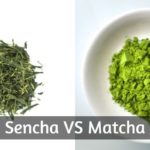You've heard of green tea and how great it is for health, and all of its supposed benefits. But are they true ?
Does green tea really have all these health benefits ?
It turns out science has does its part, and researchers have studied green tea extensively. There's still more to research, but we have some great results so far.

Table of Contents
1. Green tea contains caffeine, which gives an energy boost
Caffeine is the compound normally found in coffee, which boosts energy and improves alertness.
The way caffeine works is by blocking Adenosine from reaching the brain, by actually mimicking its properties and shape.
This means the brain is essentially tricked (for a few hours, as the caffeine works) that it is not tired, and does not require sleep. (source 1, 2)
This 5 minute video from TED-Ed explains how caffeine works, in a very simple and entertaining way.
So, green tea is kind of like a weak cup of coffee. It contains much less caffeine than a regular cup of coffee, actually about 30-50 mg per 8 oz cup.
For reference a cup of filter coffee of the same size contains almost 3 times as much caffeine.
Even with a smaller amount than coffee, green tea still manages to keep us up on our feet. Why ?
Because even a small amount of caffeine are useful in improving altertness, response time, vigilance, and memory. (source)
You could very easily replace your morning coffee with green tea, and keep the caffeine intake at a reasonable level throughout the day, only topping up with green tea as necessary.
2. Green tea also works as a sort of relaxant
But if green tea has caffeine, why don't we get a kick out of it ? Why doesn't it jumpstart us like a shot of espresso ?
The answer lies in an aminoacid found in green tea. It's called L-theanine, and it binds itself to the coffee molecules. Kind of like best buddies.
L-theanine is responsible for releasing dopamine and for stress relief, which in green tea takes the edge of caffeine. (source 1, 2, 3, 4, 5)
This means that if you were to take L-theanine by itself, it would relax you and keep you calm, but without being lethargic or getting sluggish.
It's a sense of calm that was a bit odd for me the first few times. You know how we're always thinking of something and over-analyzing everything ?
L-theanine helps you set all of that aside for a while.
Caffeine, in conjunction with L-theanine, gives a gentler energy boost, and does not shock the system. This means the jitters, sweats, and tremors associated with coffee are not going to be present when you drink green tea.
Unless you take much too much green tea throughout the day.
3. Fat burning and weight loss becomes easier with green tea
Another thing green tea is wonderful for is fat burning, and weight loss.
You've probably seen pills and supplements and extracts that were meant to help you slim down, and they all claimed to be made of green tea.
The problem is that green tea supplements often don't really work the way they're supposed to. Many companies take advantage of now much praise green tea gets for fat loss, with inconsistent results.
While green tea can help with fat burning, it will not work miracles. Research has found plenty of cases where green tea both did and did not help in reducing body fat.
However it will help in many cases, and it's been shown to help boost your metabolic rate. (source)
This is because caffeine itself, as it is found in green tea, may help the body use fat tissue as energy fuel, as well as increase physical performance by 11-12%. (source 1, 2, 3, 4)
Studies have also shown that consuming green tea regularly has been linked to decreased body fat, especially around the midsection. (source 1, 2, 3)
Another reason green tea helps in reducing fat is because it restricts the creation of new blood vessels in the fatty tissue. Meaning, green tea is actively staring the fat tissue, and it will decrease in time (as long as you keep taking green tea)
4. Green tea is associated with longer, healthier lives
This will come as no shock, given what you've read so far.
But the antioxidants and the caffeine and everything else that makes up your cup of green tea actually leads to a longer, healthier life.
For example in a study made on 40,530 Japanese adults, increased green tea consumption was linked to lower probabilities of death by the most common diseases. (source 1, 2)
Death by heart disease was lower by 31% in women, and 22% in men.
Risk of death from stroke was also lowered by 42% in women, and 35% in men.
The people who were significantly less likely to die by the diseases mentioned above were those who drank 5 or more cups of green tea per day.
This is no surprise, since green tea has a host of beneficial properties. We're only halfway through them, and they seem to make such an impact.
5. Alzheimer and Parkinson disease risks may be lowered with green tea
There is good news for everyone who is reaching their retirement age.
Green tea seems to have a positive impact on the aging brain, lowering the chances of developing Parkinson's or Alzheimer's disease as you age.
This is because the cathecin compounds found in green tea have several protective effects on neurons - test tubes and animal model research, no humans were researched for this yet.
All of this points to green tea's cathecins as possibly being useful in reducing the risk of developing neurodegenerative diseases in old age.
For example a study on the relationship between green tea's antioxidants and neurodegenerative diseases suggests that Parkinson's disease risk may be lowered if green tea is consumed regularly.(source)
For Alzheimer's the results were a bit iffy, because some other studies failed to show the same promise.
More human research is needed to this topic, however it sounds like we're getting fairly promising results with green tea.
(If you like this article so far, you can pin it to your Pinterest board by clicking the image below. The article continues after the image.)
6. Green tea is a rich source of antioxidants, which promote healthy cell growth
We come to the main reason green tea is so well loved, and the subject of many studies.
As it turns out, green tea contains loads of antioxidants.
You might've heard of them before, but I doubt anyone's really explained them and what they do.
In short and skipping many medical terms, our bodies grow cells at a certain rate and with a certain 'data package'. Sometimes, that process gets corrupted by poor lifestyle choices, terrible eating habits, undereating, most diseases, and so on.
This is how free radicals are born, electrons born without a pair and looking to 'steal' from cells what they need. (source 1, 2 )
Meaning your body's bells won't really be made the way they're supposed to be, because of missing parts that were stolen.
Antioxidants come and help things out, filling in the blanks, and making sure cells develop as they should.
As it happens, green tea has a lot of antioxidants, and you're going to get them.
This will help in lowering the risk of several diseases, most types of cancer, and contribute to your overall health. (source 1, 2, 3, 4, 5, 6)
In order to get these benefits, you'll need to drink green tea regularly. More on that later.
7. Green tea has antibacterial properties
Another great thing about green tea is that it's also mildly antibacterial.
This tea just keeps on getting better, doesn't it ?
Green tea's antibacterial properties come from the cathecins mentioned earlier.
They can and do inhibit the growth of some bacteria, including the one that's responsible for most cavities and bad breath cases. (source 1, 2, 3)
Another way your teeth and mouth will benefit from drinking green tea is by getting rid pf plaque.
Plaque is what's left on your teeth after you eat, and it can slowly but surely build up into hardened tartar, which is harder to get rid of than plaque.
So drinking green tea regularly will help reduce bad breath, slow down tartar buildup, and also prevent some infections.
This is starting to sound like a great item to have around the house, and I'm going to make a cup right now.
8. Type 2 diabetes risk is lowered by consuming green tea regularly
Diabetes is a serious concern for many people. Type 2 diabetes is characterized by the body either not producing enough insulin, or not reacting to the insulin it produces.
Insulin is essential in burning glucose, otherwise the body will quickly transform it into fat deposits.
This used to be a medical problem that affected mostly older adults. In the past few years, more and more children have been diagnosed with this type of diabetes, because of the high sugar levels in their diet. (source)
Drinking green tea regularly may help in reducing the impact this sort of diabetes has on the body, and also reduce blood sugar levels. (source)
Green tea can make the body more sensitive to insulin, which is going to help keep the disease under control. (source 1, 2)
Of course, exercising and maintaining a healthy meal system will also help in managing Type 2 diabetes, and will possibly help green tea work better on your body.
9. Green tea contains vitamin C, boosts immunity
Green tea leaves have been reported to contain about 250 mg of vitamin C, per 100 gr of leaves. This is mostly for Japanese green tea, which is processed more lightly than Chinese green tea by just steaming and drying the leaves.
That massive vitamin C concentration is true for unbrewed tea leaves, and the brewing process (heat) does affect it.
For reference, 100 gr of orange contain about 53 mg of vitamin C.
Kiwis contain more vitamin C than orange, reaching 93 mg for the same 100 gr. Keep that in mind next time you're boosting your immunity.
Vitamin C helps boost immunity and reduces inflammation and helping cells regenerate. It's an antioxidant as well, which means it will help your body function better.
A study done on green tea available in the U.S. retail market (green tea teabags from various brands) showed that the vitamin C content of brewed green tea is negligible (under 0.5 mg for 100 gr).
This is partially because of the source of the tea - where it was grown, how it was processed, the quality of the leaves, etc. - and because of the fundamental difference between teabags and loose leaf tea.
Their finding on the unbrewed teabags showed a wide range for vitamin C, from 3 mg/100 gr and all the way to 173 mg for 100 gr of tea.
That just goes to show that you should not be pinching pennies if you're after the health benefits of green tea.
Getting yourself a good green tea, while a bit expensive, will give you a better brew.
10. Some skin disorders are easier to treat with green tea
Skin disorders that imply the cells are working in overdrive may be treated with green tea.
Psoriasis, dandruff, and other skin problems where the skin produces too many cells, too fast, can possibly be tamed with green tea. (source)
This is because green tea slows down the aging process of cells, and as such it can help lower cell production.
Another side affect of this is that green tea could possibly increase lifespan.
Lifespan is determined mostly by how many times the cells reproduce throughout your life. Some are programmed to renew faster, some slower - this is not taking into account any disease or medical problem, just genetics.
Green tea helping the cells renew at a slower rate can mean your cells will last a bit longer, possibly prolonging lifespan.
11. Green tea helps prevent GI disorders
When it comes to gastrointestinal disorders, many of us are at risk.
These develop in time even if we do eat relatively healthy, since our bodies do get old and break down in time.
But if you're having some discomfort already, then green tea might help. (source)
Green tea helps block the forming of cancerous cells, and as such may also help prevent several types of GI cancer, including colon and stomach cancer.
12. Green tea contains the most EGCG of all the teas
Another common problem are inflammations by disease or wounds or another ailment.
Green tea can help with this, as it has anti inflammatory properties. (source)
In fact, it has the strongest such effect of all the teas made of the Camellia sinensis plant.
This is because EGCG (epigallocatechin-3-gallate) is responsible for most of the health benefits, and green tea contains 10 times more of it than black tea.
It's mostly because of the way green tea is processed, compared to black tea. Meaning, the more processed and oxidized the tea leaves are, the lower in EGCG and antoxidants it will be.
Green tea is a very lightly processed tea, and as such has the highest antioxidant count.
This all makes green tea sound like the best friend you could ask for. So why not make a cup right now ? Here's mine.

How much green tea should you drink to get its benefits ?
We know now that green tea's one helpful drink. Very helpful, in fact, if taken regularly.
One cup of green tea a week won't help, though, as we need to consume regular amounts of green tea.
In order to get the full benefits of green tea, we need to drink regularly and in larger amounts than we'd first think. The optimal green tea intake is 3-5 cups per day.
Of course, the longer you drink green tea, the longer the effects will stay with you.
Drinking green tea for a year will help, but drinking it for the next 10 years will ensure you're better protected for those years as well.
In short, it only works as long as you take it.
So, if you're up for it, 3-5 cups of green tea per day will help you health and make you a health-conscious individual.
This applies to green tea taken in pure, brewed form. Adding any sugars to the tea will negate some of the health benefits like lowering glucose levels and aiding in fat loss.
This is because sugar - and any other sugars - will interfere, at all times, with the antioxidants.
Unfortunately this means that adding honey will also lower the health benefits of green tea, since it too is a sugar. Though it has its own health benefits, they won't be enough to counter the sugar.
It won't negate the green tea, but it will impair it a bit.
Can anyone drink green tea ?
Some people should stay away from green tea, precisely because of the caffeine and polyphenols in this tea.
This means young children, pregnant women, and the very elderly should consult with a medic before taking green tea.
Another segment of the population that should keep green tea to a minimum, or avoid it altogether are people with stomach problems.
The tannins found in green tea (and in black tea)can raise the acidity level in the stomach, which means those with ulcers or gastritis won't handle it very well.
And if you know you have IBS or suffer from severe bouts of diarrhea, then green tea might not be o great for you either. The caffeine in it can trigger a very uncomfortable bowel movement, even in a low dose.
There are many benefits in green tea, though some people may be too sensitive to the caffeine level in the tea.
Even though it's not very large (30-50 mg) it's still a bit much for children, for example.
However green tea is alright for teens and older, which means that if you maintain a habit of drinking green tea regularly in youth, you will most probably have a much easier time in old age, and might not need to actively consume green tea still.
Are there side effects for green tea ?
When consuming too much green tea, you might get the regular side effects that come with too much caffeine consumption.
Like dizziness, anxiety, jitters, insomnia, headaches, when there was too much caffeine ingested. (source 1, 2, 3, 4, 5)
Consuming too much caffeine while pregnant can interfere with the proper development of the fetus, and possibly induce a miscarriage.
Your doctor will be able to tell you, if your are pregnant, how much caffeine you can take. Or if you can take any at all. Not all pregnancies are the same.
As a general rule, we shouldn't be ingesting more than 300 mg of caffeine per day. (source)
Other side effects of green tea include interfering with blood thinners, which means taking aspiring along with green tea is not a great idea, or warfarin either.
A good green tea to start your day
You know pretty much all there is to know now about green tea's health benefits, and its side effects as well.
As with everything, moderation is key. Don't go overboard with the green tea,a s more than 5 cups/day can be a bit risky.
If you're also looking for a good recommendation for green tea, then this one will help you out.
It's a Japanese green tea, which means the leaves have been steamed and dried. You should be able to get a nice, pale green color from this sencha.
The pack is good for about 20-30 servings of tea, depending on how much tea you add to each cup.
It's an organic green tea, and comes from a family farm in Japan near Mt. Fuji.
This is a simple green tea, and has no other added flavors.
It's meant to be enjoyed as-is, possibly without any sugar if you can manage it.
You can check the listing on Amazon for this tea, and read the reviews as well.
Final thoughts
I hope I managed to clear things up for you. Green tea's benefits are often anecdotal, and research helps immensely when sorting the true from the maybe.
Still, more research is needed for such a topic, and it's really something we need to look into.
If green tea really is such a wonderful drink, and it seems to be, then we need to use it to its fullest potential.
If you want to know more about coffee or tea, feel free to check the related articles below. Who knows what else you might find ?






